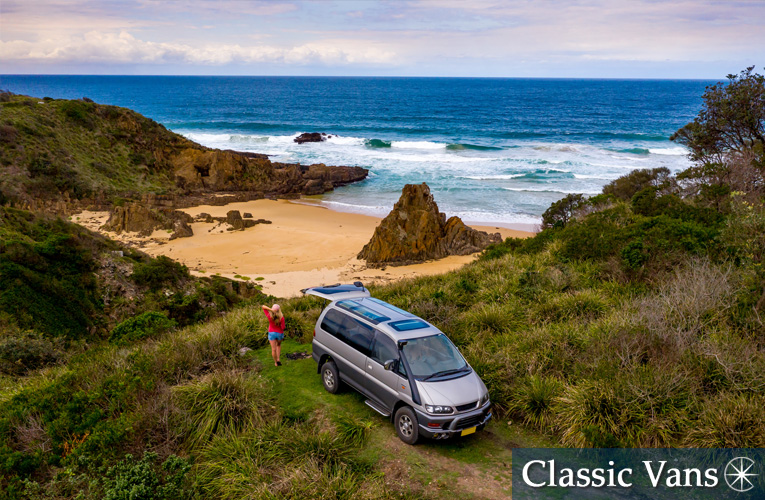
Attention all camping enthusiasts: While there’s nothing wrong with cruising the coast, state or country roads in a full-sized RV, using a smaller conversion van can be a great alternative for those who aren’t quite ready for the size and complexity of driving around a huge recreational vehicle.
Pitching a tent or “roughing it” has its charms, but if you’re looking for a little more comfort and ease, a conversion van might be the option for you.
Top advantages of using a conversion van on your next camping trip
Lower initial purchase cost
The purchase price of a conversion van is significantly less expensive than that of an RV, especially if you go for a used one. For example, a brand new 2023 Chevrolet Express 2500 7 Passenger Explorer can cost as little as $84,995, and a used older model in good condition could run you less than $25,000. By contrast, a new 2024 Fleetwood Discovery RV starts at $467,100.
Better fuel efficiency
The cost of driving is significantly more economical in a conversion van. A conversion van can run about 18 miles per gallon cross-country. The miles per gallon for an RV would be lucky to be half of that, not to mention the costly expenses they incur for maintenance along the way.
Lower maintenance costs
Maintenance costs for conversion vans are generally lower than those for full-sized RVs. Because conversion vans are built on standard van chassis, they use more commonly available parts, making them easier and less expensive to repair. In contrast, RV-specific parts can be more costly and might require specialized service.
Additionally, the simpler mechanical systems in a conversion van usually translate to fewer potential points of failure, reducing the likelihood of needing major repairs.
Increased comfort
Compared to tent camping, a van is so much more comfortable. Even if you’re planning on backpacking, having a conversion van to come back to when it starts to downpour can be a lifesaver. If you’re planning on backpacking a long way from home, the conversion van can be used in lieu of paying for dingy motels. Conversion vans can be a true outdoorsman’s best asset!
What To Look For When Buying a Used RV, Motorhome or Campervan
Tips, advice and questions to ask when buying a used travel rig or home-on-wheels.
Versatility
The versatility of a conversion van is one of its most appealing features. Unlike full-sized RVs, which are generally purpose-built for camping or long-term living, conversion vans can easily transition between different roles.
You can use it as your daily driver during the week for commuting to work or running errands and then transform it into a comfortable camper for weekend getaways. This dual-purpose functionality makes a conversion van a highly practical choice for those who want both a functional daily vehicle and a mobile living space for travel.
Maneuverability
Conversion vans generally have better handling on the road than full-sized RVs, making turns and lane changes more effortless. Their smaller footprint and lighter weight allow for better control, especially in tricky driving conditions like heavy traffic or winding roads.
The ease of maneuverability makes conversion vans a great choice for those who may be new to driving large vehicles, as they handle more like a standard car than a bulky RV.
Accessibility
Conversion vans can access places that may be off-limits for larger RVs, such as certain campgrounds with size restrictions or low overpasses, making them more convenient for a wider range of travel destinations.
Their smaller size also allows for easier parking, whether you’re in a crowded urban area or on a narrow mountain road. With a conversion van, you’re less likely to encounter restrictions and more likely to enjoy a broader range of travel destinations.
Where Can You Legally Park a Campervan Overnight?
Learn where you can (and can’t) park your campervan or motorhome while on the road.
Faster set up
Setting up a conversion van for camping is typically much faster than setting up a full-sized RV. Conversion vans are often designed with integrated, multifunctional features like fold-out beds or pop-up rooftops, allowing you to convert your living space in mere minutes.
You don’t have to deal with the complexities of slide-outs, leveling systems or external hook-ups that can be time-consuming in larger RVs. This speed and ease of setup enable you to spend more time enjoying your destination and less time fiddling with your accommodations.
Easier to store
Conversion vans are generally easier to store than full-sized RVs due to their smaller dimensions. This means you’re more likely to be able to store a conversion van in your own driveway, garage or a smaller storage unit, which can lead to substantial savings on storage fees.
Furthermore, the smaller size means you won’t need a specialized or dedicated space, which is often the case with larger RVs that can’t fit into standard-sized driveways or garages. This ease of storage not only makes a conversion van more convenient but also potentially more cost-effective when it comes to long-term ownership.
Better off-road capabilities
Generally speaking, conversion vans have better off-road capabilities compared to full-sized RVs, which tend to be more cumbersome and less agile on uneven terrain. Many conversion vans are built on robust chassis with higher ground clearance and available all-wheel-drive systems, making them suitable for navigating gravel roads, forest trails or even more challenging off-road conditions.
This opens up a broader range of camping and adventure opportunities, allowing you to explore more remote locations that would be inaccessible with a larger RV.
Top 2023 Road Trip Destinations for Campervans (California Edition)
Thinking about taking a California road trip in your RV or campervan but don’t know where to start? Check out our 2023 guide to the top RV parks in California.
Less depreciation
Conversion vans generally experience less depreciation compared to full-sized RVs, making them a more financially sound investment in the long run. Since many conversion vans are based on commercial or passenger van platforms, they benefit from a broad resale market, which can include not just campers but also businesses and large families. This diverse demand helps maintain their value over time.
Additionally, the initial cost of a conversion van is often lower than that of a full-sized RV, which means you’re starting with a smaller financial outlay, reducing the total amount of value lost to depreciation over the years.
More purchase options
When it comes to buying a vehicle for your camping adventures, conversion vans offer a wider array of options compared to full-sized RVs. Because they’re built on standard van platforms, you can choose from various makes, models and configurations to suit your specific needs and budget. This allows you greater flexibility in terms of engine types, interior layouts and added features.
Furthermore, conversion vans are popular enough that you’ll find a robust market for both new and used vehicles, giving you the opportunity to choose a van that best aligns with your camping goals and financial constraints. With such a wide range of choices, you’re more likely to find the perfect fit for your lifestyle.
Let Classic Vans help you find your dream conversion van for your next camping trip
Bottom line: If you’re not considering a conversion van for your next camping trip, you may be missing out! Want to know the best place to start? Try checking out Classic Vans’ huge inventory of new and used conversion vans. We offer low-cost nationwide delivery on every purchase. Find out why Classic Vans has everything you and your companions need for your next road trip!



